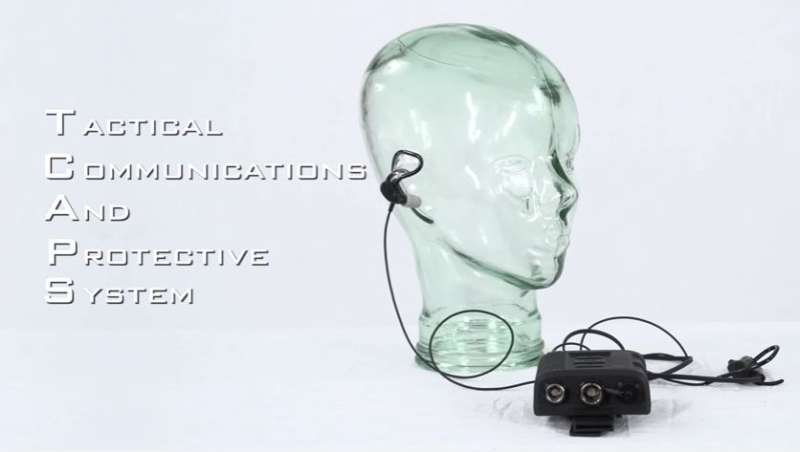(Tech Xplore)—Soldiers' ears have had a tough challenge. Historically, soldiers have had to choose between hearing protection and force protection. In other words, maintaining situational awareness was not in line with the need to maintain hearing protection. Not good.
"Your ears can't handle loud sounds without suffering mechanical damage to the inner ear that results in permanent hearing loss," said Lt. Col. Kristen Casto, audiology consultant to the Army's surgeon general, in an NPR report.
If a video from the Program Executive Office (PEO) Soldier is anything to go by, the technology to assure a better deal is around. The PEO provides U.S. soldiers with equipment and they have a story to tell about something called TCAPS, which stands for Tactical Communication and Protective System. TCAPS' benefits are in mission effectiveness, safety, and survivability, said the video notes. When there is gunfire or some type of event with a high decibel rating, TCAP goes to work allowing for sounds within normal health parameters.
TCAP can also increase low signature type sounds; if the soldier perceives that an enemy is in the area, the soldier can turn up the volume and hear things otherwise missed. Lt. Col. Casto said that "We recognize that traditional hearing protection in the form of ear plugs often limits your ability to hear soft sounds well. The ideal solution is something like a TCAPS device that allows you to hear soft sounds but also be aware of your surroundings..."
This is a device that looks like normal earplugs but is "smart" in being able to make sounds that are too loud for healthy ears softer and sounds that are too soft, listenable.
Doug Brungart, chief scientist at the Walter Reed National Military Medical Center's audiology and speech pathology center, said in an NPR report that the protectors look like a pair of earbuds but they have electronics built-in. Brungart said you can think of the system as having an adjustable volume knob. "The louder the sound outside gets," he says, "the more it turns down the volume. The person wearing the device can still hear the sound, but it's never going to get so loud that it's going to be damaging." Similarly, the device can increase the volume of soft sounds.
Joe Palca, a science correspondent for NPR, said that some models can connect to a soldier's communication gear.
Maj Mark Owens, assistant product manager, TCAPS, in the video said they have to find technologies that can provide increased hearing but at the same time protection from impulse noise and sustained-type damage events. Owens also said hearing protection is really a quality of life issue.
The ability to communicate meaningfully and take inputs from the environment are critical, he added.
Palca said that about 20,000 of the new TCAPS devices have been deployed in the field so far. Adnan Farooqui in Ubergizmo said that "...the United States Army has gradually been inducting the Tactical Communication and Protective System smart earplugs system into service."
"Hearing loss is a big problem in the military," said Palca. "According to Defense Department statistics, more than half of all troops returning from Iraq or Afghanistan suffer from some sort of damage to their hearing."
© 2016 Tech Xplore





















